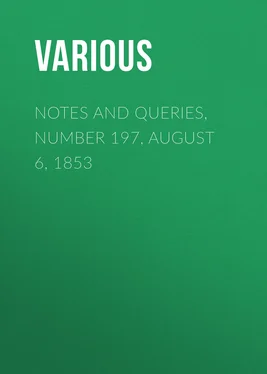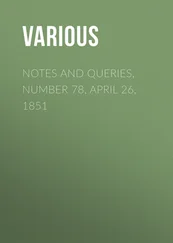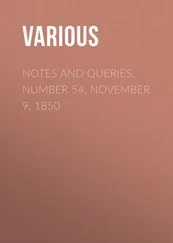Various - Notes and Queries, Number 197, August 6, 1853
Здесь есть возможность читать онлайн «Various - Notes and Queries, Number 197, August 6, 1853» — ознакомительный отрывок электронной книги совершенно бесплатно, а после прочтения отрывка купить полную версию. В некоторых случаях можно слушать аудио, скачать через торрент в формате fb2 и присутствует краткое содержание. Жанр: foreign_antique, periodic, foreign_edu, на английском языке. Описание произведения, (предисловие) а так же отзывы посетителей доступны на портале библиотеки ЛибКат.
- Название:Notes and Queries, Number 197, August 6, 1853
- Автор:
- Жанр:
- Год:неизвестен
- ISBN:нет данных
- Рейтинг книги:4 / 5. Голосов: 1
-
Избранное:Добавить в избранное
- Отзывы:
-
Ваша оценка:
- 80
- 1
- 2
- 3
- 4
- 5
Notes and Queries, Number 197, August 6, 1853: краткое содержание, описание и аннотация
Предлагаем к чтению аннотацию, описание, краткое содержание или предисловие (зависит от того, что написал сам автор книги «Notes and Queries, Number 197, August 6, 1853»). Если вы не нашли необходимую информацию о книге — напишите в комментариях, мы постараемся отыскать её.
Notes and Queries, Number 197, August 6, 1853 — читать онлайн ознакомительный отрывок
Ниже представлен текст книги, разбитый по страницам. Система сохранения места последней прочитанной страницы, позволяет с удобством читать онлайн бесплатно книгу «Notes and Queries, Number 197, August 6, 1853», без необходимости каждый раз заново искать на чём Вы остановились. Поставьте закладку, и сможете в любой момент перейти на страницу, на которой закончили чтение.
Интервал:
Закладка:
Birmingham.
The Case referred to by Shakspeare in Hamlet (Vol. vii., p. 550.).—
"If the water come to the man."— Shakspeare.
The argument Shakspeare referred to was that contained in Plowden's Report of the case of Hales v. Petit, heard in the Court of Common Pleas in the fifth year of the reign of Queen Elizabeth. It was held that though the wife of Sir James Hale, whose husband was felo-de-se , became by survivorship the holder of a joint term for years, yet, on office found, it should be forfeited on account of the act of the deceased husband. The learned serjeants who were counsel for the defendant, alleged that the forfeiture should have relation to the act done in the party's lifetime, which was the cause of his death. "And upon this," they said, "the parts of the act are to be considered." And Serjeant Walsh said:
"The act consists of three parts. The first is the imagination, which is a reflection or meditation of the mind, whether or no it is convenient for him to destroy himself, and what way it can be done. The second is the resolution, which is the determination of the mind to destroy himself, and to do it in this or that particular way. The third is the perfection, which is the execution of what the mind has resolved to do. And this perfection consists of two parts, viz. the beginning and the end. The beginning is the doing of the act which causes the death; and the end is the death, which is only the sequel to the act. And of all the parts, the doing of the act is the greatest in the judgment of our law, and it is, in effect, the whole and the only part the law looks upon to be material. For the imagination of the mind to do wrong, without an act done, is not punishable in our law; neither is the resolution to do that wrong which he does not, punishable; but the doing of the act is the only point the law regards, for until the act is done it cannot be an offence to the world, and when the act is done it is punishable. Then, here, the act done by Sir James Hale, which is evil and the cause of his death, is the throwing of himself into the water, and death is but a sequel thereof, and this evil act ought some way to be punished. And if the forfeiture shall not have relation to the doing of the act, then the act shall not be punished at all, for inasmuch as the person who did the act is dead, his person cannot be punished, and therefore there is no way else to punish him but by the forfeiture of those things which were his own at the time of the act done; and the act was done in his lifetime, and therefore the forfeiture shall have relation to his lifetime, namely, to that time of his life in which he did the act which took away his life."
And the judges, viz. Weston, Anthony Brown, and Lord Dyer, said:
"That the forfeiture shall have relation to the time of the original offence committed, which was the cause of the death, and that was, the throwing himself into the water, which was done in his lifetime, and this act was felony."–"So that the felony is attributed to the act, which act is always done by a living man and in his lifetime," as Brown said; for he said, "Sir James Hale was dead, and how came he to his death? It may be answered, By drowning. And who drowned him? Sir James Hale. And when did he drown him? In his lifetime. So that Sir James Hale being alive, caused Sir James Hale to die; and the act of the living man was the death of the dead man. And then for this offence it is reasonable to punish the living man who committed the offence, and not the dead man. But how can he be said to be punished alive when the punishment comes after his death? Sir, this can be done no other way but by devesting out of him, from the time of the act done in his life, which was the cause of his death, the title and property of those things which he had in his lifetime."
Конец ознакомительного фрагмента.
Текст предоставлен ООО «ЛитРес».
Прочитайте эту книгу целиком, на ЛитРес.
Безопасно оплатить книгу можно банковской картой Visa, MasterCard, Maestro, со счета мобильного телефона, с платежного терминала, в салоне МТС или Связной, через PayPal, WebMoney, Яндекс.Деньги, QIWI Кошелек, бонусными картами или другим удобным Вам способом.
1
There is a book called History of Party, from the Rise of the Whig and Tory Factions Chas. II. to the Passing of the Reform Bill , by G. W. Cooke: Lond. 1836-37, 3 vols. 8vo.; but, as the title shows, it is limited in scope.
2
See Haweis's Sermons on Evangelical Principles and Practice : Lond. 1763, 8vo.; The True Churchmen ascertained; or, An Apology for those of the Regular Clergy of the Establishment, who are sometimes called Evangelical Ministers: occasioned by the Publications of Drs. Paley, Hey, Croft; Messrs. Daubeny, Ludlam, Polwhele, Fellowes; the Reviewers, &c. : by John Overton, A. B., York, 1802, 8vo., 2nd edit. See also the various memoirs of Whitfield, Wesley, &c.; and Sir J. Stephens Essays on "The Clapham Sect" and "The Evangelical Succession."
3
It is not so very "singular," when we remember that the bishops were what Lord Campbell and Mr. Macauley call " judiciously chosen" by William. On this point a cotemporary remarks, "Some steps have been made, and large ones too, towards a Scotch reformation, by suspending and ejecting the chief and most zealous of our bishops, and others of the higher clergy; and by advancing, upon all vacancies of sees and dignities, ecclesiastical men of notoriously Presbyterian, or, which is worse, of Erastian principles . These are the ministerial ways of undermining Episcopacy; and when to the seven notorious ones shall be added more, upon the approaching deprivation, they will make a majority; and then we may expect the new model of a church to be perfected." (Somers' Tracts , vol. x. p. 368.) Until Atterbury, there were few High Church Bishops in Queen Anne's reign in 1710. Burnet singles out the Bishop of Chester: "for he seemed resolved to distinguish himself as a zealot for that which is called High Church ."— Hist. Own Time , vol. iv. p. 260.
4
Of Izaak Walton his biographer, Sir John Hawkins, writing in 1760, says, "he was a friend to a hierarchy, or, as we should now call such a one, a High Churchman ."
5
The practice of snuff-taking has made the sneezing at anything a mark of contempt, in these degenerate days.
Интервал:
Закладка:
Похожие книги на «Notes and Queries, Number 197, August 6, 1853»
Представляем Вашему вниманию похожие книги на «Notes and Queries, Number 197, August 6, 1853» списком для выбора. Мы отобрали схожую по названию и смыслу литературу в надежде предоставить читателям больше вариантов отыскать новые, интересные, ещё непрочитанные произведения.
Обсуждение, отзывы о книге «Notes and Queries, Number 197, August 6, 1853» и просто собственные мнения читателей. Оставьте ваши комментарии, напишите, что Вы думаете о произведении, его смысле или главных героях. Укажите что конкретно понравилось, а что нет, и почему Вы так считаете.












